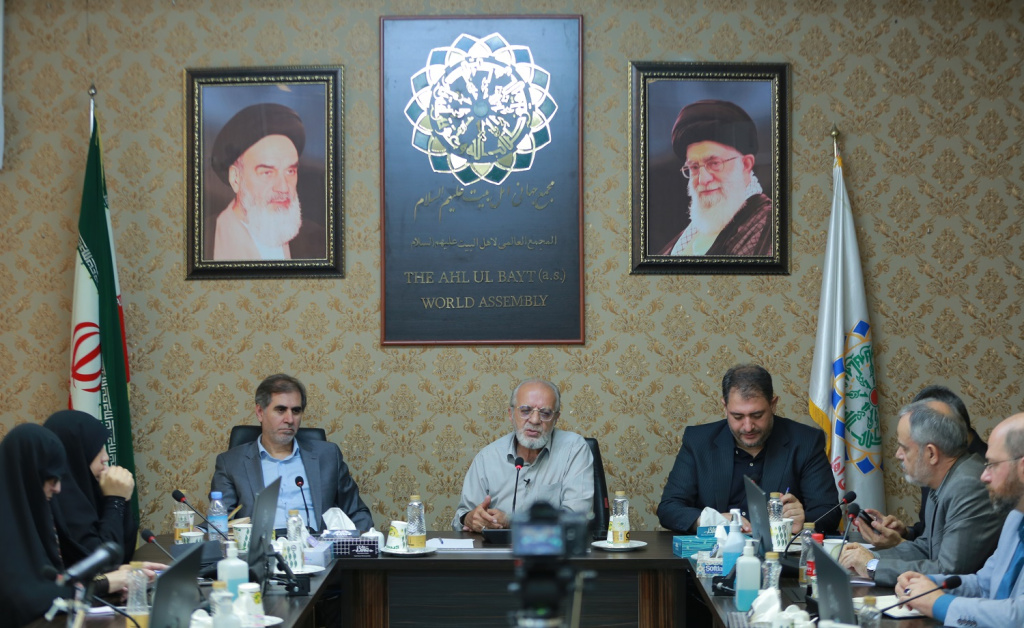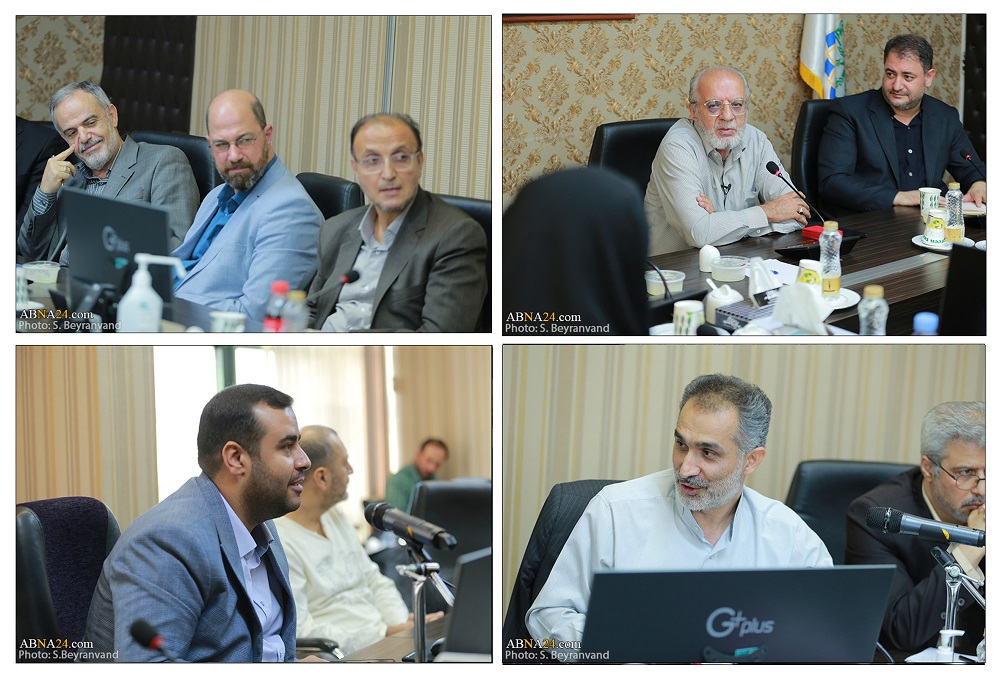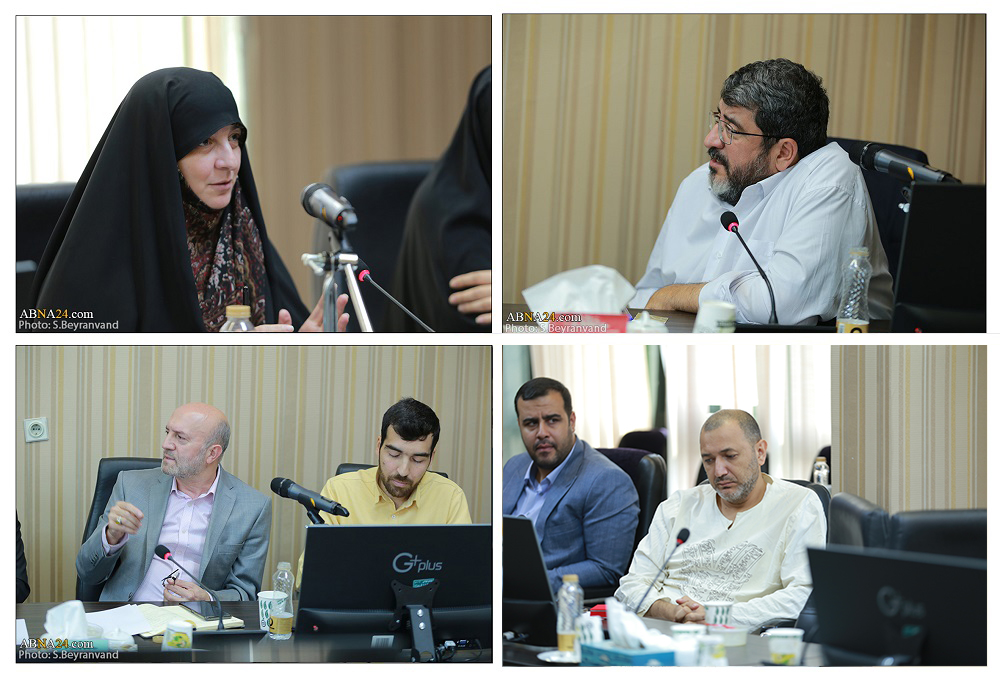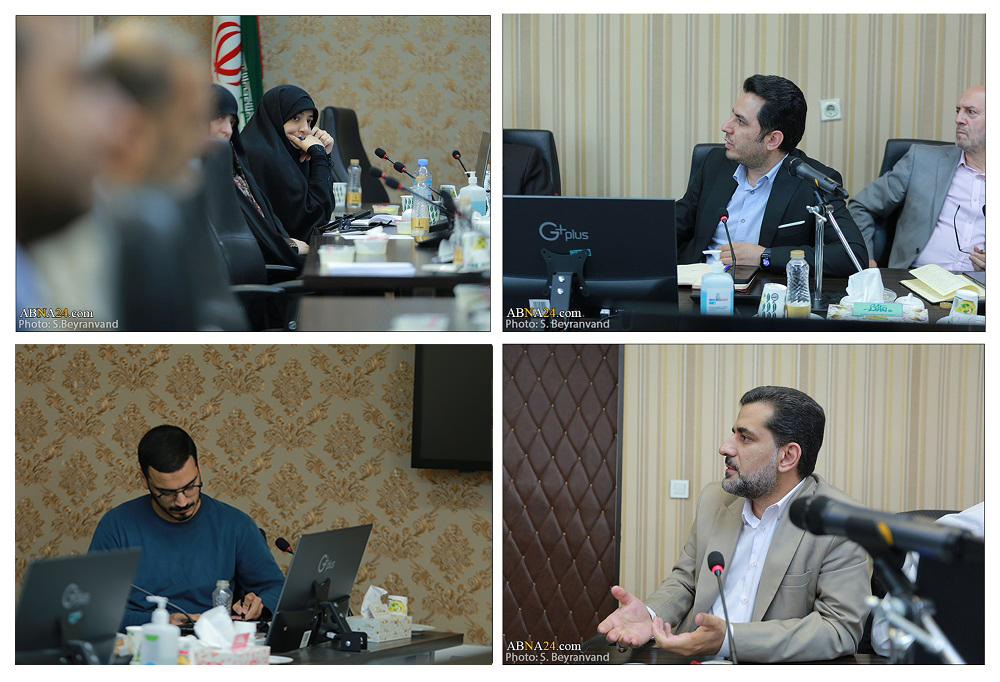Session of “Requirements of Media Narration of AhlulBayt (a.s.) School in Today’s World” held by ABNA
In this session, prominent media professors and activists in the international arena expressed their views on the requirements of the media narration of AhlulBayt (a.s.) school, capacities, opportunities, and some problems in this regard.
ABWA Official Website – On Tuesday, July 4, 2023, a brainstorming session of professors and international media activists on the topic “Requirements of Media Narration of AhlulBayt (a.s.) School in Today’s World”, hosted by ABNA News Agency, was held at the AhlulBayt (a.s.) World Assembly.

At the beginning of the session, Dr. Khojaste, a member of ABNA International News Agency’s Policymaking Board, referring to content production, stated, “Our biggest issue is news production. How and with what subtleties and observances to have an effective narrative, with the best role-playing, from the AhlulBayt (a.s.) school in today’s world, should be discussed. This exchange of opinions leads us to the media school of AhlulBayt (a.s.) so that we can explain and present it to the audience.”
Further in the session, some media professors and activists in the international arena expressed their views on the requirements of the media narration of AhlulBayt (a.s.) school, capacities, opportunities, and some problems in this regard.
Emphasizing the importance of news and information and considering centralism as one of the requirements of media activity, Sohail Asa’ad, producer and international media activist, stated, “We are scattered in terms of presenting narratives. While in my opinion, we should focus on and strengthen a specific point.”
“Every day we establish a new network and news agency, while we do not pay much attention to the effectiveness of the narrative and focus on its presentation,” added the Argentinian activist, referring to the concentration of prominent news corporations in the world in presenting uniform narratives.

Morteza Ghoroqi, the former IRIB’s anchor also said in this session, “Expertise is not seen in (our) news agencies and media outlets. The prominent media outlets of the world generally have a professional and prominent columnist who narrates the views and ideology governing that media, or even the intellectual movement. Specialized news agencies such as ABNA, which have the task of media reportage of the AhlulBayt (a.s.) school, need specialized staff.”
“A media outlet must have a genuine will to be professional,” he added, “In our narratives, in addition to knowing the target community in different countries, we must know the standard language of this work and train or identify active journalists in this regard. Media narrative for the people of the world requires international experience and work abroad.”
Then, Ms. Elham Shakeri, in expressing her point of view, considered the most important issue in news broadcasting to be the appropriate platform and language and said, “In Iran, this defect is seen so that in the face of the target society, an imposing tone is seen most of the time. We are lagging in the use of today’s tools, and considering the speed of world developments, we don’t have time for trial and error. We must choose professional teams. We need professional and expert teams, both in terms of web design and the appearance quality of websites and in choosing different platforms and formats.”

“Data mining is one of the appropriate features for making decisions and producing targeted content,” the international media activist added, “All these works require budgets. But in the case of purposeful action, we will see its results. For example, what purposeful, consistent, and continuous activity have we done to show Iran is beautiful and powerful in the world? At the same time, many people in the world are eager to know about Iran and the achievements of the Iranian Islamic Revolution. Also, in the developments of today’s world, it is an inevitable necessity. On this basis, we should also carry out the media narrative of AhlulBayt (a.s.) in a targeted manner. Are we going to introduce AhlulBayt (a.s.) to the Shiites and AhlulBayt (a.s.) followers? Or will we convey such news, information, and knowledge to non-Muslims as well? Each of these cases requires different functions and types of narration.”
Further in the session, Ms. Zaynab Shariatmadar, another expert and media activist, stated, “The form and content presented in AhlulBayt News Agency should be in accordance with the character and teachings of AhlulBayt (a.s.). Creating a discourse centered on Shiite beliefs and confronting Islamophobia and Shiaphobia are among the main tasks in the media narrative of AhlulBayt (a.s.).”
This university professor, while emphasizing the central role of women in the narration about AhlulBayt (a.s.), added, “In order to narrate about AhlulBayt (a.s.), in addition to being active ourselves, we need to activate our audience as well. In my opinion, women have a more appropriate and effective capacity for active and purposeful narration.”

Dr. Fuad Izadi, Professor of International Relations at Tehran University, the other speaker at this session, expressed his suggestions on an effective media narrative about AhlulBayt (a.s.).
A senior analyst of American affairs, Izadi emphasized the “high capacities and abilities for Shiite activities, as well as media work related to AhlulBayt (a.s.) in the world” and said, “Among AhlulBayt (a.s.) followers in the world, a large number have studied journalism and communication, who may be interested in working with specialized news agencies related to Shiite activities, such as ABNA. There is another group who are not journalists, but their interest in AhlulBayt (a.s.) and the Islamic Republic has raised concern and capacity in them that they want and can help the media narration about AhlulBayt (a.s.) in various fields. The third group is the AhlulBayt (a.s.) enthusiasts who can financially help the media narrators of AhlulBayt (a.s.). These people, if they realize that they can do something to promote Shia and the media narrative of AhlulBayt (a.s.), will definitely help.”
Referring to some considerations in international activities, Dr. Izadi included the use of representative capacities of some institutions, such as the AhlulBayt (a.s.) World Assembly, in different countries as effective strategies in international activities.
In part of the session, Hassan Sadraei Aref, head of AhlulBayt (a.s.) International News Agency - ABNA - while welcoming the professors and international media experts, considered the media narrative of the AhlulBayt (a.s.) school and the artistic expression of Shiite teachings, as well as informing about the activities of Shiites around the world, among the duties and missions of the AhlulBayt (a.s.) News Agency and included the mentioned points as capital and road map for the News Agency.
It is worth mentioning that the session was held with the participation of professors and activists such as Dr. Khojsteh a media professor, Dr. Rashed, Deputy for International Affairs of the AhlulBayt (a.s.) World Assembly, Dr. Shariatmadar, Director General of African Arabs Affairs of the Assembly, Dr. Fuaad Izadi, Morteza Ghorghi, Sohail Asa’ad, and a group of other activists and editors of international news agencies.
**************
End/ 345
In this session, prominent media professors and activists in the international arena expressed their views on the requirements of the media narration of AhlulBayt (a.s.) school, capacities, opportunities, and some problems in this regard.
ABWA Official Website – On Tuesday, July 4, 2023, a brainstorming session of professors and international media activists on the topic “Requirements of Media Narration of AhlulBayt (a.s.) School in Today’s World”, hosted by ABNA News Agency, was held at the AhlulBayt (a.s.) World Assembly.
At the beginning of the session, Dr. Khojaste, a member of ABNA International News Agency’s Policymaking Board, referring to content production, stated, “Our biggest issue is news production. How and with what subtleties and observances to have an effective narrative, with the best role-playing, from the AhlulBayt (a.s.) school in today’s world, should be discussed. This exchange of opinions leads us to the media school of AhlulBayt (a.s.) so that we can explain and present it to the audience.”
Further in the session, some media professors and activists in the international arena expressed their views on the requirements of the media narration of AhlulBayt (a.s.) school, capacities, opportunities, and some problems in this regard.
Emphasizing the importance of news and information and considering centralism as one of the requirements of media activity, Sohail Asa’ad, producer and international media activist, stated, “We are scattered in terms of presenting narratives. While in my opinion, we should focus on and strengthen a specific point.”
“Every day we establish a new network and news agency, while we do not pay much attention to the effectiveness of the narrative and focus on its presentation,” added the Argentinian activist, referring to the concentration of prominent news corporations in the world in presenting uniform narratives.

Morteza Ghoroqi, the former IRIB’s anchor also said in this session, “Expertise is not seen in (our) news agencies and media outlets. The prominent media outlets of the world generally have a professional and prominent columnist who narrates the views and ideology governing that media, or even the intellectual movement. Specialized news agencies such as ABNA, which have the task of media reportage of the AhlulBayt (a.s.) school, need specialized staff.”
“A media outlet must have a genuine will to be professional,” he added, “In our narratives, in addition to knowing the target community in different countries, we must know the standard language of this work and train or identify active journalists in this regard. Media narrative for the people of the world requires international experience and work abroad.”
Then, Ms. Elham Shakeri, in expressing her point of view, considered the most important issue in news broadcasting to be the appropriate platform and language and said, “In Iran, this defect is seen so that in the face of the target society, an imposing tone is seen most of the time. We are lagging in the use of today’s tools, and considering the speed of world developments, we don’t have time for trial and error. We must choose professional teams. We need professional and expert teams, both in terms of web design and the appearance quality of websites and in choosing different platforms and formats.”

“Data mining is one of the appropriate features for making decisions and producing targeted content,” the international media activist added, “All these works require budgets. But in the case of purposeful action, we will see its results. For example, what purposeful, consistent, and continuous activity have we done to show Iran is beautiful and powerful in the world? At the same time, many people in the world are eager to know about Iran and the achievements of the Iranian Islamic Revolution. Also, in the developments of today’s world, it is an inevitable necessity. On this basis, we should also carry out the media narrative of AhlulBayt (a.s.) in a targeted manner. Are we going to introduce AhlulBayt (a.s.) to the Shiites and AhlulBayt (a.s.) followers? Or will we convey such news, information, and knowledge to non-Muslims as well? Each of these cases requires different functions and types of narration.”
Further in the session, Ms. Zaynab Shariatmadar, another expert and media activist, stated, “The form and content presented in AhlulBayt News Agency should be in accordance with the character and teachings of AhlulBayt (a.s.). Creating a discourse centered on Shiite beliefs and confronting Islamophobia and Shiaphobia are among the main tasks in the media narrative of AhlulBayt (a.s.).”
This university professor, while emphasizing the central role of women in the narration about AhlulBayt (a.s.), added, “In order to narrate about AhlulBayt (a.s.), in addition to being active ourselves, we need to activate our audience as well. In my opinion, women have a more appropriate and effective capacity for active and purposeful narration.”

Dr. Fuad Izadi, Professor of International Relations at Tehran University, the other speaker at this session, expressed his suggestions on an effective media narrative about AhlulBayt (a.s.).
A senior analyst of American affairs, Izadi emphasized the “high capacities and abilities for Shiite activities, as well as media work related to AhlulBayt (a.s.) in the world” and said, “Among AhlulBayt (a.s.) followers in the world, a large number have studied journalism and communication, who may be interested in working with specialized news agencies related to Shiite activities, such as ABNA. There is another group who are not journalists, but their interest in AhlulBayt (a.s.) and the Islamic Republic has raised concern and capacity in them that they want and can help the media narration about AhlulBayt (a.s.) in various fields. The third group is the AhlulBayt (a.s.) enthusiasts who can financially help the media narrators of AhlulBayt (a.s.). These people, if they realize that they can do something to promote Shia and the media narrative of AhlulBayt (a.s.), will definitely help.”
Referring to some considerations in international activities, Dr. Izadi included the use of representative capacities of some institutions, such as the AhlulBayt (a.s.) World Assembly, in different countries as effective strategies in international activities.
In part of the session, Hassan Sadraei Aref, head of AhlulBayt (a.s.) International News Agency - ABNA - while welcoming the professors and international media experts, considered the media narrative of the AhlulBayt (a.s.) school and the artistic expression of Shiite teachings, as well as informing about the activities of Shiites around the world, among the duties and missions of the AhlulBayt (a.s.) News Agency and included the mentioned points as capital and road map for the News Agency.
It is worth mentioning that the session was held with the participation of professors and activists such as Dr. Khojsteh a media professor, Dr. Rashed, Deputy for International Affairs of the AhlulBayt (a.s.) World Assembly, Dr. Shariatmadar, Director General of African Arabs Affairs of the Assembly, Dr. Fuaad Izadi, Morteza Ghorghi, Sohail Asa’ad, and a group of other activists and editors of international news agencies.
**************
End/ 345

